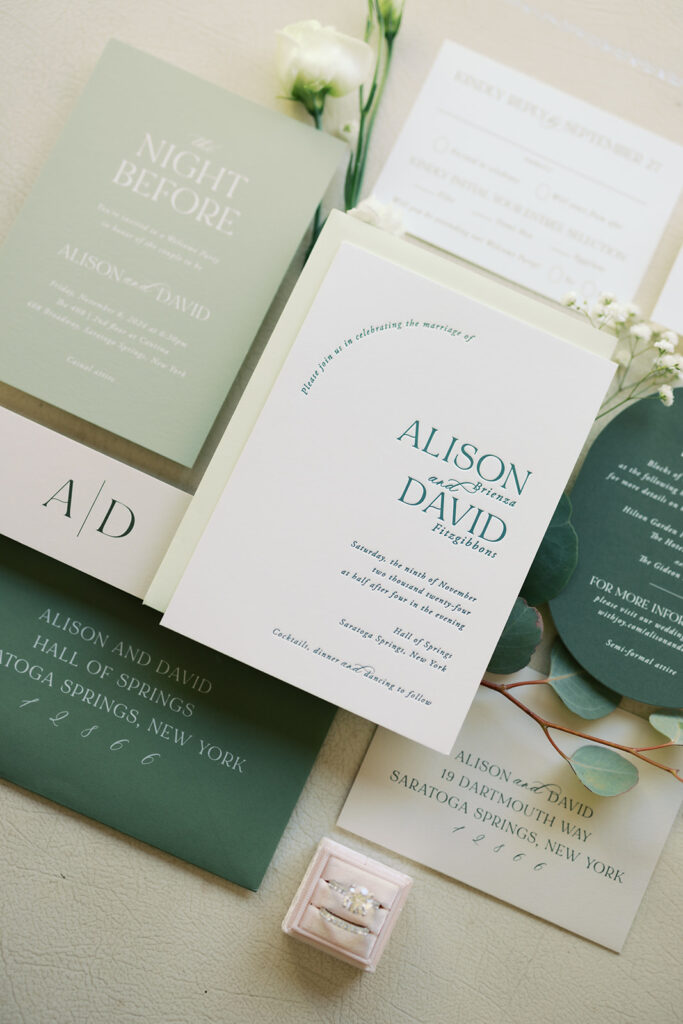Rehearsal Dinner Etiquette
Planning a rehearsal dinner can raise a lot of questions: Who should be invited? Should you include plus-ones? When is the right time to host it, and who handles the planning and expenses? And what about speeches—who is expected to say a few words during this special event? We’re here to answer all your rehearsal dinner etiquette questions and help ensure this memorable pre-wedding celebration runs smoothly and stress-free!

Who should be invited?
The rehearsal dinner guest list traditionally includes those closest to the couple and directly involved in the wedding. As part of rehearsal dinner etiquette, this typically means immediate family members, the entire wedding party (bridesmaids, groomsmen, flower girls, ring bearers, and their significant others), the officiant, and anyone else actively participating in the ceremony, such as those walking down the aisle.
Additionally, it’s considered a kind and respectful gesture to invite out-of-town guests who have traveled to attend the wedding, as it shows appreciation for their effort and adds a warm, welcoming touch to the festivities. While not required, you might also choose to invite close friends or other meaningful individuals, especially if you want the event to feel more inclusive. The size and formality of your rehearsal dinner will ultimately depend on your preferences, budget, and the atmosphere you want to create for this special pre-wedding event.
Should you include plus ones?
When it comes to inviting plus-ones to the rehearsal dinner, the general rule is to include the significant others of your wedding party and immediate family members. This ensures that those closest to you feel comfortable and supported during the event.
For other guests, such as out-of-town attendees or optional invites, it’s up to your discretion whether their plus-ones are included. If you’re opting for a more intimate gathering and choose not to invite additional guests, make this clear on the rehearsal dinner invitation. For example, address invitations specifically to the individuals you’re inviting and avoid using “and guest.” Clear communication helps avoid confusion and ensures everyone understands the guest list. If you’re unsure, it’s always a good idea to consider the dynamics and relationships involved to strike the right balance of inclusivity and intimacy.
When is the right time to host a rehearsal dinner?
The rehearsal dinner is traditionally scheduled for the evening before the wedding, immediately following the ceremony rehearsal. This timing is both practical and symbolic. Practically, it ensures that everyone involved in the wedding ceremony—such as the wedding party, officiant, and family members—are already gathered, making attendance easy and convenient. Symbolically, it sets the tone for the wedding weekend, giving key participants a chance to connect, celebrate, and share meaningful moments together before the big day. Rehearsal dinner etiquette also plays a role in shaping the event, ensuring it’s a thoughtful and enjoyable experience for all attendees.
Hosting the rehearsal dinner the night before allows the couple and their loved ones to relax after a busy day of preparations and rehearsals. It creates a natural opportunity for everyone to bond, whether it’s through heartfelt toasts, storytelling, or simply enjoying a meal together. It also helps out-of-town guests feel welcomed and appreciated, particularly if this is their first chance to spend time with others in the wedding party.
Who handles the planning and expenses?
Traditionally, the groom’s family handles the planning and expenses of the rehearsal dinner, as a way to contribute to the wedding celebrations. However, this custom is not a strict rule and can vary based on the couple’s preferences, family dynamics, or budget.
In many modern weddings, the couple themselves may choose to plan and pay for the event, especially if they want to have creative control over the theme, menu, or guest list. Alternatively, both families may decide to share the cost or split responsibilities, such as one family handling the venue while the other manages the catering.
If a family member is hosting the rehearsal dinner, it’s important for the couple to communicate openly about expectations, including the budget, guest list, and style of the event. No matter who takes on the planning or financial responsibility, the focus should remain on creating a warm and welcoming gathering that sets the tone for the wedding weekend.
Who is expected to give a speech?
At the rehearsal dinner, speeches are typically more informal and personal compared to those given at the wedding reception. It’s a good idea to have a general plan for speeches so that the dinner stays on schedule, but allow room for meaningful moments to unfold naturally. Here’s who is traditionally expected—or often asked—to give a speech:
- The couple: The rehearsal dinner is an excellent time for the couple to share their gratitude. This speech is often more personal than their reception speeches and gives them a chance to thank their families, wedding party, and any guests who have traveled from out of town. Many couples also use this moment to express excitement for their wedding day, acknowledge the support they’ve received during the planning process, and perhaps share a fun or touching story about their journey together.
- The Host(s): If the rehearsal dinner is being hosted by the groom’s family or another party, the host typically kicks off the evening with a welcome speech. This sets the tone for the dinner and gives the host an opportunity to thank everyone for attending. They might also share a few kind words about the couple, reflecting on their relationship or expressing their excitement for the upcoming wedding. This speech doesn’t need to be long but serves as a warm introduction to the evening.
- Close family members: Parents, siblings, or other close family members often give heartfelt toasts during the rehearsal dinner. Parents may use this opportunity to welcome their child’s partner into the family or share memories about the couple. Siblings, on the other hand, might offer humorous anecdotes or more personal reflections. The smaller, more intimate setting of the rehearsal dinner allows these speeches to feel less formal and more genuine.
- The Best Man and Maid of Honor: While the best man and maid of honor typically deliver their main speeches at the wedding reception, they might also share a shorter toast or a few kind words at the rehearsal dinner. This is often an opportunity to say something more personal or casual, especially since the audience is smaller and filled with those closest to the couple.
- Anyone Who Feels Inspired: The rehearsal dinner’s informal atmosphere often encourages spontaneous speeches from other guests. This might include grandparents, close friends, or other members of the wedding party who want to share a memory or offer well-wishes. These unscripted moments can be some of the most heartfelt and memorable parts of the evening. While it’s not expected of every guest, allowing an open floor for toasts can lead to beautiful, unexpected sentiments.

Do we need to provide gifts or favors at the rehearsal dinner?
Providing gifts or favors at the rehearsal dinner is not required, but it can be a thoughtful way to show appreciation for your guests and align with rehearsal dinner etiquette. Many couples use this occasion to present gifts to their wedding party, such as personalized items, meaningful keepsakes, or experiences, as a token of gratitude for their support. It’s also common to give parents a special gift during the dinner, like a heartfelt letter, photo book, or sentimental memento, to thank them for their love and encouragement throughout the wedding planning process.
For out-of-town guests, a small gesture like a local treat or welcome bag can show appreciation for the effort they made to attend. Dinner favors, such as candles, edible treats, or mini bottles of wine, are optional and should align with the tone and style of the event. Ultimately, whether you provide gifts or favors depends on your preferences and budget, but a personal thank-you or heartfelt toast can be just as meaningful.
What type of event should the rehearsal dinner be?
The type of event your rehearsal dinner should be depends on your personal style, budget, and the atmosphere you want to create. Traditionally, rehearsal dinners are formal sit-down meals held at a restaurant, private home, or banquet space. However, modern rehearsal dinners have become more flexible, ranging from elegant affairs to casual gatherings. Rehearsal dinner etiquette can also guide the formality and structure of the event, ensuring it reflects your vision while remaining thoughtful and inclusive.
The rehearsal dinner typically lasts about two to three hours, which allows enough time for mingling, enjoying the meal, giving toasts, and wrapping up with a few heartfelt moments. Whether formal or informal, the event should set the tone for the weekend, providing an opportunity for guests to connect, celebrate, and prepare for the big day ahead without feeling rushed or overly extended.
How formal should the rehearsal dinner invitations be?
The formality of your rehearsal dinner invitations should align with the style and tone of the event. For a formal or semi-formal rehearsal dinner, printed or professionally designed invitations are a polished and appropriate choice. These can be mailed to guests or included as an insert with your wedding invitations. A consistent design that complements your wedding stationery adds a cohesive and elegant touch.
For more casual gatherings, digital invitations—such as those sent via email or through platforms like Paperless Post or Evite—are perfectly acceptable. Alternatively, if the rehearsal dinner is an intimate or informal event, a personal phone call, text, or verbal invitation can work well, especially for close family and friends.
No matter the format, be sure to include all the essential details: date, time, location, dress code (if applicable), and who is hosting. Clear communication ensures your guests feel informed and can RSVP easily, whether your dinner is a formal affair or a laid-back celebration.

Planning a rehearsal dinner is an exciting opportunity to kick off your wedding celebrations and connect with your closest loved ones in an intimate setting. From deciding who to invite—such as immediate family, the wedding party, and out-of-town guests—to following rehearsal dinner etiquette, thoughtful guest list planning ensures everyone feels welcomed and appreciated. Whether you choose a formal sit-down dinner or a casual gathering, the event should reflect your personal style and create a relaxed atmosphere for heartfelt toasts and meaningful moments. The timing of the dinner, typically held the evening before the wedding, and its duration—about two to three hours—should allow for a smooth flow of events without overwhelming you or your guests. By balancing tradition with personal touches, your rehearsal dinner can set the perfect tone for the celebrations ahead.
If you’re feeling unsure about the details or simply want to enjoy this special time without the stress of planning, we’re here to help. Contact us to to help you take care of the logistics so you can focus on celebrating with the people who matter most!